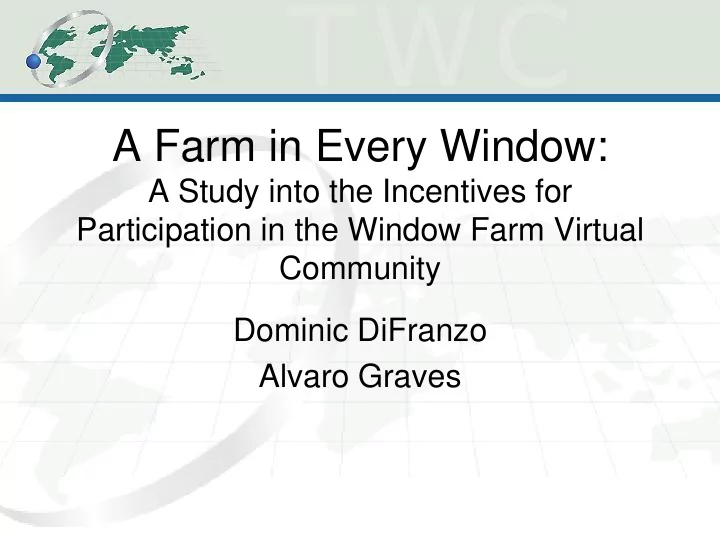

A Farm in Every Window: A Study into the Incentives for Participation in the Window Farm Virtual Community Dominic DiFranzo Alvaro Graves
Outline • Introduction • Window Farm Community • Incentive/Participation Models • Methodology • Results • Future Work/Conclusion
Introduction • Many virtual communities fail or die off due to users not participating. • Need better understanding on the motivations and incentives on contributing to virtual communities. • No unifying model or consensus on incentives or incentivization in virtual communities and this makes studying them very difficult.
Introduction • Our study looked into the incentive structures for members of the Window Farm virtual community. – Look and tie different models & methodologies from different disciplines – Propose a methodology to tie motivations reported by users to the activity they express in the community
Window Farm
Window Farm Community • Multi-blogging platform • R&D-I-Y (research and develop it yourself) • 20,000 registered users • 2,000 visiting users in a month • 45-60 activity contributors in a month • About 10 users are responsible for over 80% of the content in a month
Methodology • Used models and methodology from different disciplines (see paper for more) • Two parts (survey & classification and analysis of the behavior in the community) • Tied results from survey to classification of behavior for particular users
• Survey – 48 Responses – Asked questions about Motivations for different behavior and actions – Also asked questions on sense of community and activity levels • Behavior classification – (Question, Answer, Sharing, Social) – Done by hand
Results • Overall Motivations – Self satisfaction and self-improvement – Learning new skills • Answering and Sharing had two similar Motivations (Fun to do, Obligation to community) • Answering had a different motivation (Ideology) • Sharing differed also (Getting feedback on ideas)
Results • Neither the Fun or Obligation to community motivation were positively correlated with answering questions or sharing ideas. • Ideology was positively was correlated to answering questions. • Getting feedback on ideas was correlated to sharing ideas.
Future Work • These motivations tie well with Open Source communities (best practices?) • Connect models better to develop better unified understanding of motivation • Run experiments to test models and features in communities. • Develop better methodology and methods to explore this topic
Questions? • Thanks to Britta Riley and Window Farm Team • Send questions to difrad@rpi.edu • Twitter: @difrad
Recommend
More recommend